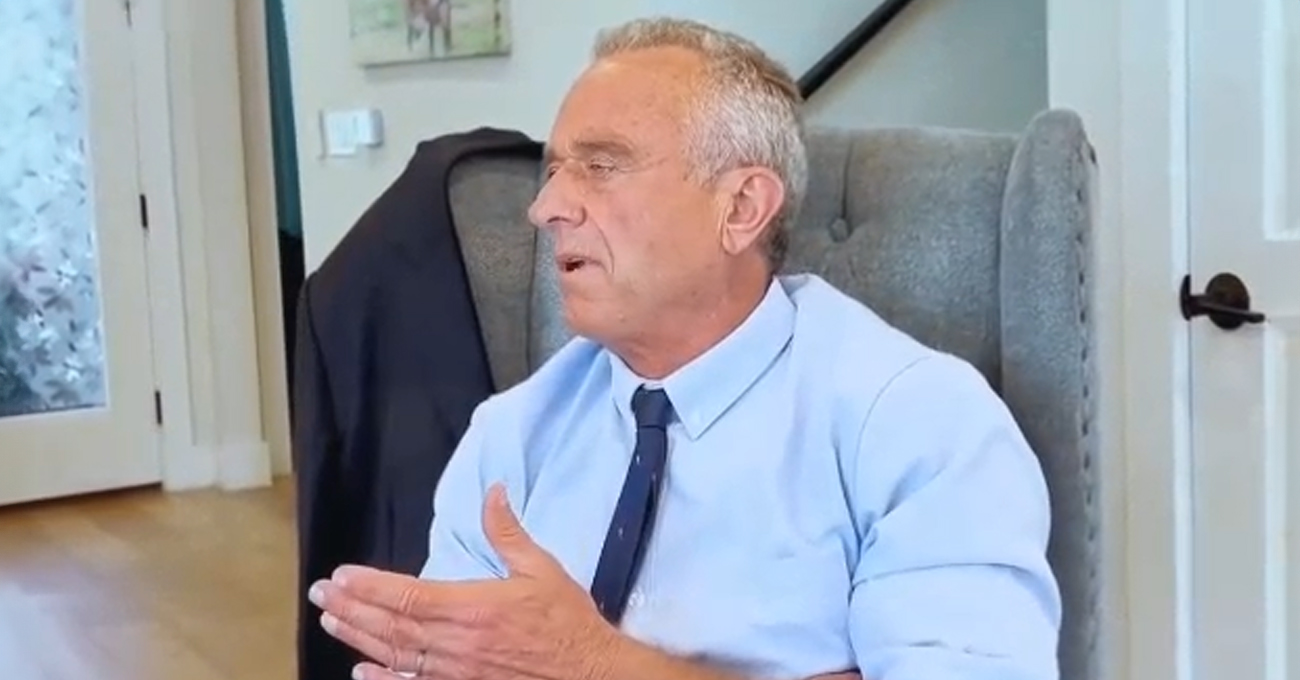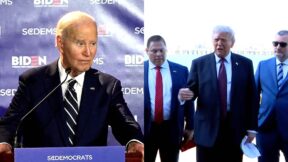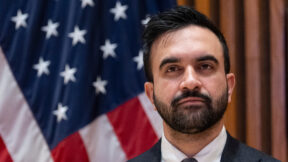‘Mass Murderer in Waiting’: Writer Accuses LA Times of Editing His Anti-RFK Op-Ed to Support Conspiracy Theorist

Eric Reinhart, a political anthropologist, social psychiatrist, and psychoanalytic clinician who wrote an op-ed for the Los Angeles Times regarding Robert F. Kennedy Jr.’s nomination for secretary of health and human services, tweeted his strong displeasure at how the column was edited, accusing the paper of twisting his words to “suggest an argument entirely opposite” to his “clear intent.”
Kennedy’s questioning before two Senate committees this week has been highly contentious, as he’s been grilled by multiple senators skeptical of his qualifications and incredulous at his excuses for his many past controversial comments and anti-vaccine activism.
On Friday, Times owner Patrick Soon-Shiong tweeted a link to Reinhart’s article as published and added a caption. “Trump’s healthcare disruption could pay off — if he pushes real reform,” he wrote. “He is our best chance of doing so.”
Soon-Shiong was criticized last year after he blocked the Times from endorsing Vice President Kamala Harris for president, a move that led to three staffers resigning as members of the editorial board. The Washington Post, owned by Jeff Bezos, faced similar critiques when it also punted on issuing an endorsement in the final weeks of the election. Grumbling about Soon-Shiong’s pro-MAGA turn ramped up when he reportedly quashed an op-ed critical of President Donald Trump’s cabinet nominations, publicly recruited outspoken conservative CNN contributor Scott Jennings to join the editorial board, and urged his editors to “take a break from writing about Trump.”
Reinhart’s column, as published, was headlined “Opinion: Trump’s healthcare disruption could pay off — if he pushes real reform” and used a featured image of Kennedy looking defiant during his testimony.
Reinhart fired back at Soon-Shiong and the editing of his article in a series of tweets Friday morning.
“I am the author of this OpEd,” wrote Reinhart, “which was given a misleading title and from which key lines were cut—lines that made very clear that RFK Jr is dangerously ignorant, has absolutely no business near HHS, and is effectively a mass murderer in waiting.”
“My first time working with the Los Angeles Times, and I expect also my last,” he continued. “My suggested title, which reflects the content I expected to go to press, was ‘RFK Jr’s Wrecking Ball Won’t Fix Public Health.’ A vote for RFK Jr is a vote for nothing but chaos, the opposite of the essential public-systems building I argue for in the OpEd, and mass death.”
Reinhart acknowledged that “[e]ditors edit and control final copy and [headlines],” but argued that “editing out a very central and timely point in the minutes before sending to press while then also assigning a title and image that suggest an argument entirely opposite to the author’s clear intent is bad.”
He posted additional tweets showing some of the misleading edits and linking to his column as he originally drafted it.
As Reinhart pointed out, his original text warned of “[m]ajor changes” to America’s health systems that “may leave us even worse off than we already are,” and drew a connection to Luigi Mangione, the accused assassin of UnitedHealthcare CEO Brian Thompson. “My opening and closing lines do not leave my stance on RFK Jr remotely ambiguous,” he wrote.
Reinhart’s original conclusion:
It is time to demand fundamental transformations in how we approach health in America, but a wrecking ball alone won’t deliver what we need.
Although RFK Jr. and Luigi Mangione are both responses to the same underlying problem of US healthcare corruption, there is a major difference between them: one operated outside the law to kill one person in defense of millions, whereas the other — via his egomaniacal disregard for scientific evidence — seeks to use law itself to inflict preventable death on those millions.
The conclusion as published by the Times completely removes any mention of Mangione and Reinhart’s argument that Kennedy’s confirmation risks causing “preventable death” for “millions” of people:
Such an approach would shift us away from overreliance on expensive medical treatments and toward public health as it should be: a project by and for the people that makes full use of government resources to empower communities.
We should demand fundamental transformations in how we approach health in America, but a wrecking ball alone won’t deliver what we need.
Other edits include the original headline Reinhart penned — “RFK Jr’s Wrecking Ball Won’t Fix Public Health” — being changed and this subheading being completely omitted:
Trump’s health officials should pursue fundamental transformations of U.S. health systems, but destruction alone won’t deliver what we need. We should demand a genuinely populist solution.
Mediaite reached out to Reinhart for comment, and he said in a phone conversation with this reporter that he had originally submitted his draft on Monday, the Times had replied on Wednesday and said they wanted to “publish quickly.”
According to Reinhart, the first round of edits were “looked good to me” and “kept the essence of the piece.”
It was the last round of edits where things went off the rails. “Thirty minutes before sending to print, they sent me an email and said that the handling editor has changed and will finish the piece,” he said. This new editor “needed to make cuts,” Reinhart said he was told,” specifically regarding his last line about Magnione because it “could be read as suggesting some kind of equivalence between [him and Kennedy]” and they didn’t want to do that.
Reinhart told Mediaite that he replied to the email with the new edits “within 10 minutes” to say that he “didn’t agree” there was an equivalence and to suggest a compromise edit. He did not hear back from anyone at the Times and the article was published and he saw the changes in the final version.
He acknowledged that it’s “not so rare” for a guest columnist to not see the final headline, cover art, or final edit, but his issue was how these changes completely “reframed” what his argument was. The published version made no substantial reference to Kennedy in the text at all, while the cover art and headline suggests it was a “positive argument in favor of Kennedy’s confirmation.”
The result, said Reinhart, was that the op-ed was now “easily read, including by the owner of the paper,” as supporting Kennedy’s confirmation. The “misleading” edits “violated the spirit of ethical and responsible editing, in my view, because they weren’t faithful to the intent of the author,” he argued. Instead, “they inverted my intent” as someone who was “as big a critic of health care in the U.S. as anyone” but “strongly opposed RFK,” because he “can only make things worse” and putting him in charge of HHS “could do major damage to the country.
Hillary Manning, a spokeswoman for the Times, told Mediaite that “Our editors in Opinion work with op-ed contributors to edit pieces for length, clarity and accuracy, among other things. No op-ed pieces are published, as edited, without the permission of the author. That includes the op-ed written by Eric Reinhart.”
Reinhart also mentioned Soon-Shiong’s recent interference with the editorial voice of the paper to push it in a more pro-Trump direction, and similar criticisms of Bezos at The Washington Post, saying this turns the media outlets into “nothing more than the mouthpiece of a very wealthy man,” which can “destroy the integrity of the newspaper.” This problem, said Reinhart was “now true of virtually every major media outlet” in the country, plus the impact of tech oligarchs like Elon Musk and Mark Zuckerberg controlling the major social media platforms.
This problem, Reinhart concluded, was not just about him and “bigger than one op-ed;” it was a symptom of the “massive problem we have in media and politics right now.”
“If I had known what they would have done” to the column, he said, then “I would have asked them not to run it.”
New: The Mediaite One-Sheet "Newsletter of Newsletters"
Your daily summary and analysis of what the many, many media newsletters are saying and reporting. Subscribe now!






Comments
↓ Scroll down for comments ↓